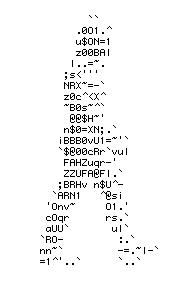Nicht verzagen, Blogger fragen
Dies die aktuelle Kolumne des Networke, John Naughton beim Observer:
If you really want to know, ask a blogger
Assiduous students of the print media will have noticed its practitioners becoming increasingly exercised about 'blogging' - the practice of publishing web-logs or online journals.
On 18 May, for example, one Geoffrey Nunberg fulminated in the New York Times about the fact that whenever one does a Google search on any topical issue, the top page rankings often go to blogs rather than established media sources (such as the New York Times ).
This was, according to Nunberg, A Bad Thing. After all, most bloggers are not professional journalists, but rank amateurs! He was not the first hack to articulate this whinge. In fact, he seems to have picked up the idea from an earlier piece in the Register, an online publication. But the mindset he represents is widespread in Big Media, so it is worth devoting a few moments to unpacking the prejudices behind it.
First, there is the contempt for 'amateur' writers, endemic in professional journalism. Hacks are always astonished by anyone who writes for no pay, so upwards of half a million such amateurs now publishing blogs leaves the pros speechless. It also leads them to deride blogs as an epidemic of vanity publishing rather than the glorious outbreak of free expression it actually represents.
Second is the assumption that anything written by an amateur is, by definition, worthless. Yet journalism has always been, as Northcliffe observed, 'the art of explaining to others that which one does not oneself understand'.
In fact, when it comes to many topics in which I have a professional interest, I would sooner pay attention to particular blogs than to anything published in Big Media - including the venerable New York Times. This is not necessarily because journalists are idiots; it's just that serious subjects are complicated and hacks have neither the training nor the time to reach a sophisticated understanding of them - which is why much journalistic coverage is inevitably superficial and often misleading, and why so many blogs are thoughtful and accurate by comparison.
Third, there is the problem - not often touched upon in the New York Times, by the way - that many controversial public issues are ignored by Big Media for the simple reason that the ideological and commercial interests of their proprietors preclude it.
This is why the US mainstream media has wound up misleading its audience about Iraq and the 'war' on terrorism. The fact that most US citizens believe a majority of the 9/11 hijackers were Iraqis rather than Saudis is a case in point.
Then there is economics. One reason blogs show up so prominently in Google searches is because weblogs are available on the web while Big Media sources increasingly are not. Instead they are locked behind pay-for firewalls. (As with Nunberg's little rant, which I have just tried to re-read - and been invited to pay $2.95 for the privilege.)
Since the whole point of the web is full and comprehensive linking, and Google ranks pages by the numbers of other pages that link to them, it is hardly surprising that blogs are winning over established media. Nobody in his right mind would link to a mere abstract.
A few Big Media outlets understand this elementary fact. The Guardian and The Observer sites are exemplary in this regard - which is why they are beginning to outrank their competitors (for example, the London Times and the New York Times ) in web searches.
The moral is: if you want to score with Google, be on the web. Otherwise, go whistle.
http://www.briefhistory.com
If you really want to know, ask a blogger
Assiduous students of the print media will have noticed its practitioners becoming increasingly exercised about 'blogging' - the practice of publishing web-logs or online journals.
On 18 May, for example, one Geoffrey Nunberg fulminated in the New York Times about the fact that whenever one does a Google search on any topical issue, the top page rankings often go to blogs rather than established media sources (such as the New York Times ).
This was, according to Nunberg, A Bad Thing. After all, most bloggers are not professional journalists, but rank amateurs! He was not the first hack to articulate this whinge. In fact, he seems to have picked up the idea from an earlier piece in the Register, an online publication. But the mindset he represents is widespread in Big Media, so it is worth devoting a few moments to unpacking the prejudices behind it.
First, there is the contempt for 'amateur' writers, endemic in professional journalism. Hacks are always astonished by anyone who writes for no pay, so upwards of half a million such amateurs now publishing blogs leaves the pros speechless. It also leads them to deride blogs as an epidemic of vanity publishing rather than the glorious outbreak of free expression it actually represents.
Second is the assumption that anything written by an amateur is, by definition, worthless. Yet journalism has always been, as Northcliffe observed, 'the art of explaining to others that which one does not oneself understand'.
In fact, when it comes to many topics in which I have a professional interest, I would sooner pay attention to particular blogs than to anything published in Big Media - including the venerable New York Times. This is not necessarily because journalists are idiots; it's just that serious subjects are complicated and hacks have neither the training nor the time to reach a sophisticated understanding of them - which is why much journalistic coverage is inevitably superficial and often misleading, and why so many blogs are thoughtful and accurate by comparison.
Third, there is the problem - not often touched upon in the New York Times, by the way - that many controversial public issues are ignored by Big Media for the simple reason that the ideological and commercial interests of their proprietors preclude it.
This is why the US mainstream media has wound up misleading its audience about Iraq and the 'war' on terrorism. The fact that most US citizens believe a majority of the 9/11 hijackers were Iraqis rather than Saudis is a case in point.
Then there is economics. One reason blogs show up so prominently in Google searches is because weblogs are available on the web while Big Media sources increasingly are not. Instead they are locked behind pay-for firewalls. (As with Nunberg's little rant, which I have just tried to re-read - and been invited to pay $2.95 for the privilege.)
Since the whole point of the web is full and comprehensive linking, and Google ranks pages by the numbers of other pages that link to them, it is hardly surprising that blogs are winning over established media. Nobody in his right mind would link to a mere abstract.
A few Big Media outlets understand this elementary fact. The Guardian and The Observer sites are exemplary in this regard - which is why they are beginning to outrank their competitors (for example, the London Times and the New York Times ) in web searches.
The moral is: if you want to score with Google, be on the web. Otherwise, go whistle.
http://www.briefhistory.com
Cyberwriter - 3. Jun, 10:43 - Blogging
0 Kommentare - Kommentar verfassen - 0 Trackbacks





















Trackback URL:
https://cyberwriter.twoday.net/STORIES/32430/modTrackback